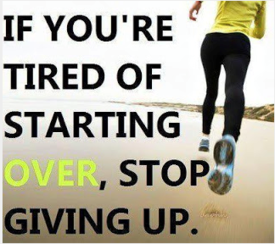Overestimating your calories burned....

teachmom32
Posts: 183 Member
Using all the calculators mentioned by everyone on this site (Scooby, iifym, etc.) I figured out my TDEE -20% and have been blissfully eating 1750 calories for over a month now. During that time I haven't lost much weight ( a little over 2 pounds), but I kept plugging away thinking it's going to catch up at some point.
Pulled out my Body Bugg and decided to start wearing it to see how accurate I was. Turns out that on days where I don't work out (rest days) I only burn 1758 calories. I'm eating 1750. With 2 rest days a week, that's a deficit of only 8 calories. On days I do work out I'm only burning about 2000 calories, unless I consciously walk/jog A LOT. I've had about 90+ minutes of activity the last two days and was finally able to get up to the 2250 burned I need to even have enough of a deficit to lose 1 pound a week.
So, here's my question. How many of you have ever realized that the calculators don't work for you? If so, what did you do? Lower your calories consumed? Increase your calories burned? Trying to fit in 90+ minutes a day of working out is not super realistic for me as I am a teacher and I have to check papers every night. Any help would be much appreciated.
Pulled out my Body Bugg and decided to start wearing it to see how accurate I was. Turns out that on days where I don't work out (rest days) I only burn 1758 calories. I'm eating 1750. With 2 rest days a week, that's a deficit of only 8 calories. On days I do work out I'm only burning about 2000 calories, unless I consciously walk/jog A LOT. I've had about 90+ minutes of activity the last two days and was finally able to get up to the 2250 burned I need to even have enough of a deficit to lose 1 pound a week.
So, here's my question. How many of you have ever realized that the calculators don't work for you? If so, what did you do? Lower your calories consumed? Increase your calories burned? Trying to fit in 90+ minutes a day of working out is not super realistic for me as I am a teacher and I have to check papers every night. Any help would be much appreciated.
0
Replies
-
Adjust what you entered into the calculator. Are you using "sedentary?" In any event, you can customize your entries here and many of us do that. And yes, lower your calorie allowance a bit. Good luck!0
-
If all else fails I always underestimate my calories exerted and overestimate my calories consumed.0
-
Just checked both calculators again and put in sedentary for Scooby. For iifym, I put in that I sleep 10 hours a day (overestimate) and that I'm sedentary the other 14 hours. Both are still spitting out that I burn a little over 2,000 calories on those days. Body bugg says 1758.
Now that I'm eating more, I don't want to decrease it, as I like the way I'm eating. So, I guess I'll have to walk/jog during my lunch break or something until my metabolism increases. My body fat percentage according to calipers is quite high (around 42%), so hopefully increasing my activity and eating a lot of protein will help raise my resting metabolism.
Just need to be patient and realize that this is going to be a LONG journey! With 50 more pounds to lose, I better mentally prepare myself for the fact that it will take me AT LEAST another year to do that, and then I will have to be diligent with maintenance. Regretting that I ever let myself get to this point!0 -
You really don't have control over your metabolism. You're born with it and the only way you get a minor increase is to build lean muscle mass to burn more calories while you are at rest. People talk about a metabolic reset but unless you've been undereating to the point of starvation that isn't going to happen.0
-
Agreed! I have a GoWearFit which is another form of the BodyBugg. I was amazed at how few calories I burn in a given day and how hard I have to work to perform 'vigorous' activity. On a day that I am walking around on campus, working out, and cleaning/cooking I'll burn maybe 2100 calories. On a totally sedentary day it's about 1700. blah! I am glad I found my GWF on Ebay because I have definitely noticed an improvement in my progress. The good thing is you can always move more if you want to eat more, or just lose fat a little more slowly.0
-
Thanks for the validation, songbyrd. I thought I was just being totally lazy by not burning 2250 calories, but it really is a tough thing to do!0
-
Calculators are based on averages. They can be a little up or a little down or right on, depending on the individual. For me, they are generally 100 or 150 calories high. In your case, the calculators sound like they are a little high. You've given it a reasonable amount of test time. Adjust accordingly to hit your goals. The bodybug is likely giving you the most accurate estimate if it is set up correctly.0
-
Calculators are good for a starting point, and that's it. The same applies to your Body Bugg. Neither of them are really accurate.
Calculators were definitely off with me. After playing around with my diet some, I've learned my maintenance is about 1800 calories/day, despite calculators saying it's 2200-2300.0 -
I don't rely on calculators of any type. If, after a few weeks, I'm not progressing how I would like, I adjust my daily calories up or down by 150-250. Sometimes a bit more if I'm way off (like last month where I made a rookie mistake and was eating 800 cals too low per day and couldn't stay awake past 8pm).
Note: This only works if you start with a reasonable assumption about your daily calories. If you start with 1300 cals or something it's going to be impossible to make the right adjustments. It sounds like you did start with a reasonable 2000 cal for maintenance and assumed 1700 would be a decent deficit. That's what I would have figured too. Now, after not progressing for a while, I'd try lowering the calories 200 per day and seeing where I was after 3 weeks or so.0 -
I don't rely on calculators of any type. If, after a few weeks, I'm not progressing how I would like, I adjust my daily calories up or down by 150-250. Sometimes a bit more if I'm way off (like last month where I made a rookie mistake and was eating 800 cals too low per day and couldn't stay awake past 8pm).
Note: This only works if you start with a reasonable assumption about your daily calories. If you start with 1300 cals or something it's going to be impossible to make the right adjustments. It sounds like you did start with a reasonable 2000 cal for maintenance and assumed 1700 would be a decent deficit. That's what I would have figured too. Now, after not progressing for a while, I'd try lowering the calories 200 per day and seeing where I was after 3 weeks or so.
Unfortunately females are prone to monthly fluctuations in body weight and even waist/abdomen circumference and bioimpedance body composition measurements you see in handheld/scale BF% estimators. It is quite another world trying to adjust your calories from month to month when you are adding in these variables. 0
0 -
The only really accurate weight to measure your calories burned is with a device that costs somewhere in the neighborhood of 35K USD... The formulas used by devices and calculators (including this site) are all estimates based on slightly different algorithms. That doesn't make them bad, it just means you have to do a lot of maintenance to find what works for you.0
-
I worry about this a lot so I try to deal with it by not eating more than 1,500 calories on my workout days (1,600 max and that is a rarity). I also go by the machines vs MFP. and I guesstimate I burn about 500 calories per workout. And since my estimation may be inaccurate I don't log all of my physical activity. I don't include any strength training and I also don't include any of the walking I do throughout the day or calories burned at work. On non workout days I aim for about 1,200 calories but if I eat my BMR (1,500) I don't beat myself up.
Can't wait until I get my HR monitor.0 -
I had the same issue, mine was my elliptical was giving me twice the actual calories I burn, It all went away when I started my body media fit (similar to body bugg), now I get the actual calories burned and have been losing weight steadily.0
-
Get a HRM. I have the Polar FT4, about $70 on Amazon. It's worth it to know your actual calories burned. Very easy to use too.0
-
They're all estimates so just adjust until you find a level that works for you. I eat the same quantity of food typically when I do lower calorie weeks vs higher calorie weeks. I just eat foods that have fewer calories per serving. So I swap out my sweets, breads, rice, cereal, dairy, nuts for lower calorie veggies, wasa crackers, laughing cow wedges, etc. If I cut portion size, I'm hungry so instead I just use lower calorie foods.
For me, most calculators tell me to eat less than I actually need to in order to lose (or maintain when I'm doing that) so it really depends on the person.0 -
I always underestimate calories burned and only eat back a portion of those calories. I plan on investing in an HRM soon!0
-
I use a body media fit (aka Go wear fit, non 24 hour fitness affiliated bodybugg) and I just set the MFP to sedentary and let the sync with MFp do the rest. Set my goal amount to 1200 and let the sync add the additional calories needed to meet my personal minimum.
That works best for me. I'll go the website and get the burn for a particular workout if I feel like it (only sometimes) and let it adjust for the rest.0 -
I don't rely on calculators of any type. If, after a few weeks, I'm not progressing how I would like, I adjust my daily calories up or down by 150-250. Sometimes a bit more if I'm way off (like last month where I made a rookie mistake and was eating 800 cals too low per day and couldn't stay awake past 8pm).
Note: This only works if you start with a reasonable assumption about your daily calories. If you start with 1300 cals or something it's going to be impossible to make the right adjustments. It sounds like you did start with a reasonable 2000 cal for maintenance and assumed 1700 would be a decent deficit. That's what I would have figured too. Now, after not progressing for a while, I'd try lowering the calories 200 per day and seeing where I was after 3 weeks or so.
Unfortunately females are prone to monthly fluctuations in body weight and even waist/abdomen circumference and bioimpedance body composition measurements you see in handheld/scale BF% estimators. It is quite another world trying to adjust your calories from month to month when you are adding in these variables.
This is why I use a few weeks as a sample size and not just a single day's weigh in. I'm not a female, but I don't think TOM happens steadily over the course of 3-4 weeks. The weird thing is that my ultimate suggestion, adjust calories by a few hundred, is the exact same thing you're going to do after looking at the numbers on the calorie counting devices. So I'm not sure what part of my statement you're saying is off because we're going to do the exact same thing to lose weight, male or female.
But I digress. I'm going to assume that no female ever lost weight before the invention of HRMs and bodybuggs and other devices.0 -
Get a HRM. I have the Polar FT4, about $70 on Amazon. It's worth it to know your actual calories burned. Very easy to use too.
She is using a Bodybugg to get an idea of her calories burned all day. A HRM would only estimate calories burned during exercise.
TDEE calculators and bodybuggs can only estimate your calories burned but in your case it sounds like your bodybugg is giving a good estimate and the calculators are over estimating. It's not your fault but I know I'd be pretty bummed about that too. I'd lower calories slowly to give yourself time to get used to it. Good luck!0 -
On Scooby's Most accurate calc, did you select Katch BMR and enter in that estimated BF%.
May discover it actually does come close.
But if your activity is the type the BodyBugg is good at measuring, walking and slow jogging, and your Harris BMR (that they base the foundation of their math on) isn't 200-400 over the Katch BMR, then trust what the BodyBugg says is avg TDEE, take deficit, and eat daily.
That will probably end up doing what DavPul says to do.
Because really, you throw in several weeks messing around, you might as well have just tested as he says to do. And good job starting at the high end. About impossible to do the same thing at the low end.
But, you should also be looking at measurements. You can be making body improvements from new exercise routine, not be dropping weight, but be dropping fat.
Because your LBM (not muscle probably) is going up.0 -
If all else fails I always underestimate my calories exerted and overestimate my calories consumed.
AMEN!! there is not such thing as accurate calorie estimation once you put in the confounding variable called the body.0 -
I think you need to lower your net calorie goal.
My TDEE is also around 1750-1800 not counting for exercise. I know this from logging and calculating actual results. On Scooby's site, he recommends doing this to calibrate a better TDEE estimate. The online calculators would have suggested 1900-2100 for me. I have a relatively low resting heart rate and low-ish blood pressure. Not sure if that contributes.
I set my net calorie goal to 1450 and then also do eat back my exercise calories. When I log my exercise, I always underestimate time spent to bring calories in line to a more realistic level. For example, MapMyRun might think I burned 700 calories on a run. MFP might think I burned 600. I estimate it was more like 500 based on my average heart rate. (i don't have a HRM, but I check my pulse occassionally using the stopwatch feature on my cell phone to make sure I am in the target zone.) Therefore, I tend to shave 15-20% off my times when entering them in MFP.0 -
I figured out about six months in that the calculators were way too low for me. This was just from logging consistently and doing the math. (SEE: http://www.myfitnesspal.com/topics/show/819055-setting-your-calorie-and-macro-targets ) If you are consistently logging, you can calculate your true TDEE using your food diary.0
-
Just like everything else. You have to fiddle around with it to find what is right for you. MFP and all those other devices give only an estimate for the 'average' person with similar statistics. That's why it is so important to adjust things manually as needed.
I use my FitBit for an estimate and normally hit around 2400 calories burned - I set my calorie goal to my 'estimated' BMR and have just recently lowered it by a little bit as I was not seeing any results with what I had been doing. It's a process and unfortunately as soon as you think you have it nailed down you drop another few pounds and have to play with it some more LOL0 -
I've always just used the calculators as a rough guide, and adjusted based on results. Trial and error.0
-
OP...nothing is set in stone...everything is an estimate. The calculators are designed to give you a starting point based on at least something that should be reasonably close to meeting your needs...from there, it's all about trial and error and making little tweaks here and there to dial it in.0
-
This is why I use a few weeks as a sample size and not just a single day's weigh in. I'm not a female, but I don't think TOM happens steadily over the course of 3-4 weeks. The weird thing is that my ultimate suggestion, adjust calories by a few hundred, is the exact same thing you're going to do after looking at the numbers on the calorie counting devices. So I'm not sure what part of my statement you're saying is off because we're going to do the exact same thing to lose weight, male or female.
But I digress. I'm going to assume that no female ever lost weight before the invention of HRMs and bodybuggs and other devices.
LOL.
Your replies never fail to amuse me0 -
Get a HRM. I have the Polar FT4, about $70 on Amazon. It's worth it to know your actual calories burned. Very easy to use too.
I recently purchased this and when I first used it, I was amazed how little calories I actually burned when I was exercising my butt off. My wrist watch HRM (no chest band) estimated a lot higher than this one... I wouldn't trade the Polar FT4 for anything.. best investment!0 -
Here's what I've figured out after testing out many different methods of counting/subtracting/performing ridiculous math to lose weight. First of all, I try to keep my diet as consistent as possible. Personally, I think of what I eat as the control group in my weight loss experiment. It does not change (or at least... it shouldn't). If I'm keeping my diet consistent and working my *kitten* off in the gym only three things can happen: 1) I gain weight. 2) I lose weight. 3) I stay the same. Checking your weight every week will help you know which one is happening and here's what to do depending on which scenario you're in. If you see #1, cut back on calories from your daily intake and see how you feel. You'll probably need to cut back a substantial amount, like 250-300. Check again after 2 weeks to see if you've made process. If #2 is happening, you're on the right track! Keep going. If #3 is happening, it's time to look at your intake again and either cut back or add calories. Sometimes, believe it or not, cutting back calories is not the answer. Sometimes adding 50-100 calories to your daily intake (let's say only on days that you workout) will make a substantial difference in your progress. I have learned from trying to count/micromanage weight loss that the best thing you can do is remain consistent and leave the option open to tinker with how much you eat on workout days/non-workout days.
ETA: I wanted to add that checking the scale is only one way to gage progress and depending on the work you're doing, it might not be the best way to measure your success. If you're training, especially with weights, you'll see a lot of weight redistribution before actual weight loss. Use a measuring tape and measure key areas and track your progress that way. Doesn't hurt to take pictures either Sometimes the scale is a little *kitten*. Don't live and die by it. How you LOOK and how you FEEL (stronger, sexier) are the true gages of success, in my opinion of course. 0
Sometimes the scale is a little *kitten*. Don't live and die by it. How you LOOK and how you FEEL (stronger, sexier) are the true gages of success, in my opinion of course. 0 -
I don't rely on calculators of any type. If, after a few weeks, I'm not progressing how I would like, I adjust my daily calories up or down by 150-250. Sometimes a bit more if I'm way off (like last month where I made a rookie mistake and was eating 800 cals too low per day and couldn't stay awake past 8pm).
Note: This only works if you start with a reasonable assumption about your daily calories. If you start with 1300 cals or something it's going to be impossible to make the right adjustments. It sounds like you did start with a reasonable 2000 cal for maintenance and assumed 1700 would be a decent deficit. That's what I would have figured too. Now, after not progressing for a while, I'd try lowering the calories 200 per day and seeing where I was after 3 weeks or so.
Unfortunately females are prone to monthly fluctuations in body weight and even waist/abdomen circumference and bioimpedance body composition measurements you see in handheld/scale BF% estimators. It is quite another world trying to adjust your calories from month to month when you are adding in these variables.
This is why I use a few weeks as a sample size and not just a single day's weigh in. I'm not a female, but I don't think TOM happens steadily over the course of 3-4 weeks. The weird thing is that my ultimate suggestion, adjust calories by a few hundred, is the exact same thing you're going to do after looking at the numbers on the calorie counting devices. So I'm not sure what part of my statement you're saying is off because we're going to do the exact same thing to lose weight, male or female.
But I digress. I'm going to assume that no female ever lost weight before the invention of HRMs and bodybuggs and other devices.
No, the actual menstruation obviously isn't continuous for 3-4 weeks, but the changes in estrogen, progesterone and GH change before the actual onset of menses, during the menses, and then again afterward. If a woman were to base her caloric intake on scale weight alone, she'd probably need to either have previous knowledge of exactly what trended from month to month or take 3 months to get an idea of the trend and adjust her calories from there.
A device that measures salinity, temperature, heart rate, and movement over time is going to be more accurate and give more immediate feedback, even though the end result of changing caloric intake is the same.
Don't be a wiseass.0
This discussion has been closed.
Categories
- All Categories
- 1.4M Health, Wellness and Goals
- 398.1K Introduce Yourself
- 44.7K Getting Started
- 261K Health and Weight Loss
- 176.4K Food and Nutrition
- 47.7K Recipes
- 233K Fitness and Exercise
- 462 Sleep, Mindfulness and Overall Wellness
- 6.5K Goal: Maintaining Weight
- 8.7K Goal: Gaining Weight and Body Building
- 153.5K Motivation and Support
- 8.4K Challenges
- 1.4K Debate Club
- 96.5K Chit-Chat
- 2.6K Fun and Games
- 4.8K MyFitnessPal Information
- 18 News and Announcements
- 21 MyFitnessPal Academy
- 1.5K Feature Suggestions and Ideas
- 3.2K MyFitnessPal Tech Support Questions





















